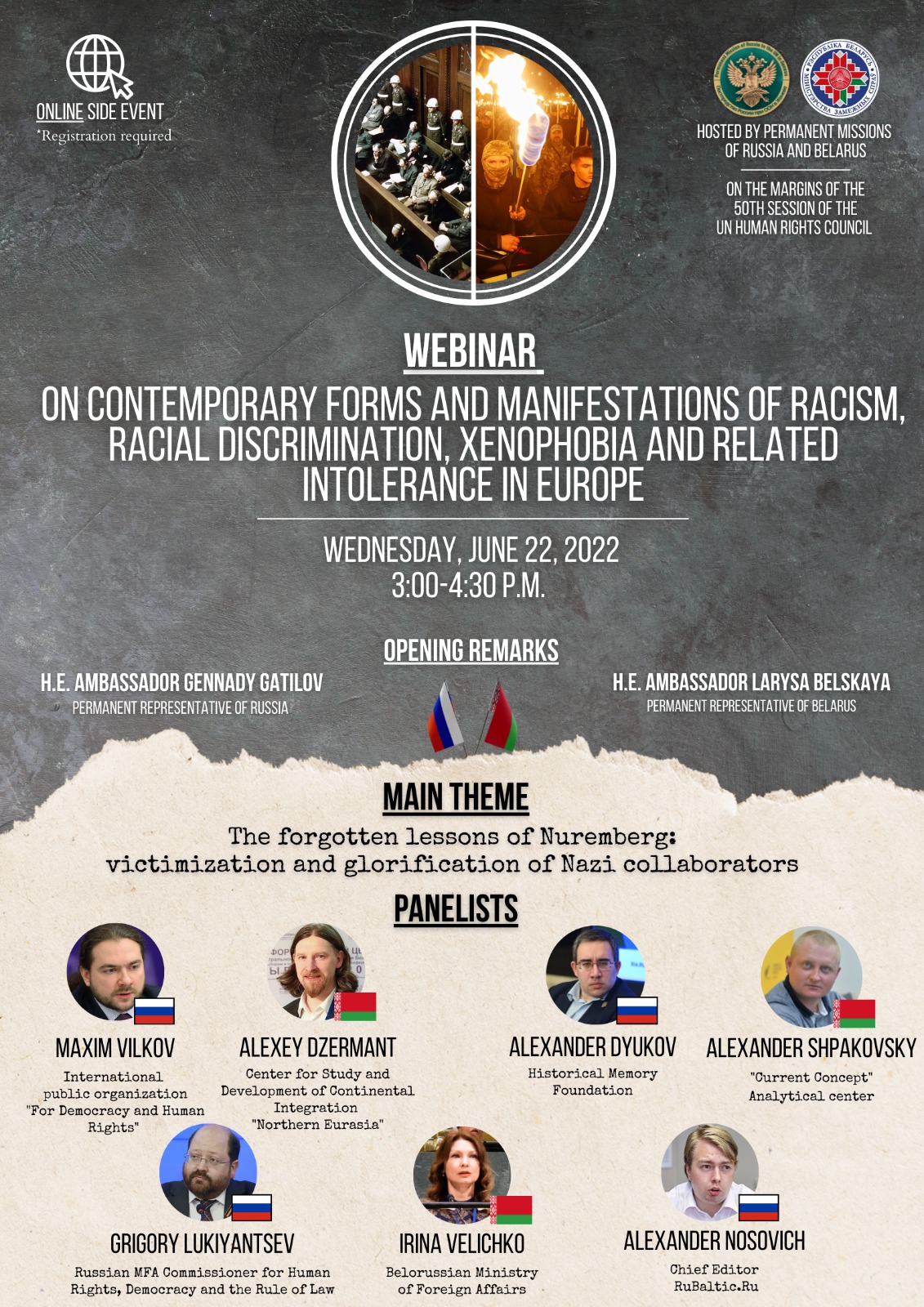Webinar on contemporary forms and manifestations of racism, racial discrimination, xenophobia and related intolerance in Europe
16.06.2022The forgotten Lessons of Nuremberg: victimization and glorification of Nazi collaborators
Wednesday, June 22, 2022
3:00-4:30 P.M.
After the end of the Second World War a system of international institutions devoted to the protection of world from another tragedy of mass genocide, cleansing policy and other crimes against humanity was established. One of the most important pillars of international security system is unconditional condemnation of all practices and manifestations of Nazism and racism in their contemporary form as well as in historical context. However, in the wake of socio- economic and political crises as well as of contemporary geopolitical confrontations the attempts to destroy this system and revise the result of the Second World War are becoming more often.
There are different tracks of destruction of the international system of combating Nazism. However, we can highlight the most common today. First of all it is glorification, including at the state level, of Nazi criminals, participants of collaborationist forces of the Second World War times. Quite often this happens at the edge of Russophobia in countries of Eastern Europe where former collaborators and Nazi criminals are equated with national heroes.
The second track of revision of the results of the Second World War is victimization of Nazi collaborators when participants of collaborationist forces are claim to be victims of circumstances and the policy of USSR, the denial of the contribution of the Soviet people to the defeat of fascism, the desecration and destruction of monuments to Soviet soldiers. Recently, in the Baltic countries, state bans on holding events on memorable dates have been added to this, and in European countries — a ban on the participation of official delegations of Belarus and Russia in such events. In contrast to direct glorification of Nazi criminals, this process is more broadly supported in Western European countries where it is an integral part of the ongoing process of equating Nazism and Communism and of the desire of a number of political actors to intrude into mass consciousness the thesis on equal responsibility of Nazi Germany and the USSR in starting the Second World War.
These processes comprise a real threat to the peace and security in Europe, contribute to the spread of hate speech and proliferation of marginal neo-Nazi political parties and organizations. This is why the efforts on preservation of unconditional condemnation of Nazism, Nazi criminals and their collaborators, prevention of the revision of the results of the Second World War, preventing the distortion of historical facts and the widest possible dissemination of information about Nazis and their collaborators’ crimes during the Second World War are important than ever before.
During the seminar organized by the Permanent Mission of the Republic of Belarus and the Permanent Mission of the Russian Federation, the panelists will share information on modern forms of glorification and victimization of Nazi criminals in Eastern Europe and their experience in combating these destructive tendencies. In addition, the event aims to draw attention to the current negative trends in the Baltic States and the European Union as a whole, where modern forms of racism and hate speech have come to light in various areas of life and are in fact encouraged by European officials against declarations about their supposedly strong commitment to human rights and the rule of law.
Opening remarks:
H.E. Mr. Gennady Gatilov, Permanent Representative of the Russian Federation;
H.E. Ms. Larysa Belskaya, Permanent Representative of the Republic of Belarus.
Panelists:
Mr. Maxim Vilkov (Interregional public organization “For Democracy and Human Rights”, Russia);
Mr. Alexey Dzermant (Center for Study and Development of Continental Integration “Northern Eurasia”, Belarus);
Ms. Irina Velichko (Ministry of Foreign Affairs, Belarus);
Mr. Grigory Lukiyantsev (Ministry of Foreign Affairs, Russia);
Mr. Alexander Dyukov (Historical Memory Foundation, Russia);
Mr. Alexander Shpakovsky (Analytical center “Current Concept”, Belarus);
Mr. Alexander Nosovich (RuBaltic.Ru, Russia).
